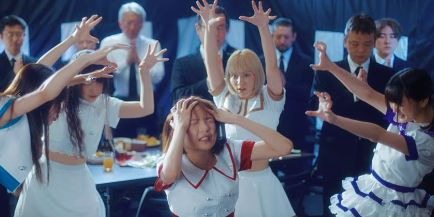[Film Review] Tokyo Horror Film Festival: Idol Never Dies (2023)

Comedy splatter legend (and the mastermind behind such Criterion classics as Zombie Ass: Toilet of the Dead and Mutant Girl Squad) Noboru Iguchi’s IDOL NEVER DiES played as the main feature of the inaugural Tokyo Horror Film Festival, which took place on July 1 in Tokyo’s Nakano ward. The festival also featured an exclusive Q&A with director Iguchi himself.
In his forty-sixth feature, Iguchi presents a satirical - if surprisingly subdued - take on the cut-throat world of the idol with a sci-fi twist. After all, the life of a J-pop idol is full of terrifying things: gruelling rehearsals, manic fans, unrealistic body standards and - according to this slice of candy coloured chaos - the end of the world.
In the countryside of Japan’s Tochigi Prefecture, idol group Eveninglory have gathered for an intense weekend of training and filming, despite the national news stating that the end of the world is en route. After one of the members, Haru, disappears without a trace, awkward and misanthropic Megumi (played by actress Momoka, ironically the only major cast member who is not an idol herself) is seemingly the only member of the group who can see her and hear her cryptic, morbid warnings about the upcoming apocalypse and what it means for Megumi. Throw in a mysterious, cacophonous sound turning people into mindless zombies, a charismatic rival band called BLOOD CHERRY, and a moralistic warning about kindness, and poor Megumi’s not exactly having the best day.
LISTEN TO OUR HORROR PODCAST!
![[Ghouls Podcast] Ghouls Watch: Bucket List of the Dead, Blood Drive, Candy Land & more](https://images.squarespace-cdn.com/content/v1/5fe76a518d20536a3fbd7246/1696261000263-58VQFOVWPE363OFGP7RF/GHOULS+WATCH.jpg)
Fans of Iguchi’s explosive and bizarre signature style might be left disappointed, although IDOL NEVER DiESDie’s subdued nature can most likely be explained due to the constraints of its cast. Fittingly, as mentioned, Idol Never Dies stars a full cast of real idols, including Nakagawa Miyuu of Maneki Kicak, Kudo Sumire of Up Up Girls, MIGMA SHELTER’s Brazil and Kaede Fuuka of Qumari Depart. If you’re not a J-pop fan, these names probably won’t mean much to you, but trust me when I say these girls are big business in an industry that is famed for its strict rules and restrictions on how idols must conduct themselves in both their personal and professional lives. As a result, IDOL NEVER DiES was probably never going to go as hard on the gore and toilet humour that Iguchi is known and loved for.
However, it’s clear to see that Iguchi is keen to experiment and explore new avenues - in his exclusive Q&A with Tokyo Horror Film Festival, Iguchi expressed a slight frustration with the current state of Japanese horror in general:
“When it comes to horror, Japanese people – especially young people – have a rather strong image of Ring or Ju-On […] In our generation, there were so many more different kinds of horror movie. There were movies where murderers attacked or psychic demons possessed people. I have the impression that the younger generation today has a narrower view of this, and only consider the idea of a long-haired ghost crawling toward you… it may be a problem on the side of the creator.”

With this in mind, you’ll have a lot more fun with Idol Never Dies by leaving any preconceived expectations of mutant girls and robot geisha at the door.
Being a unashamed idol vehicle means that J-pop fans (or even just fans of cute costuming and bubblegum pop in general) will find a lot to love in a film so generously peppered with musical breaks and dance montages, but IDOL NEVER DiES doesn’t let the industry off too easily. The messages are clear, even if the plot is somewhat convoluted, as Iguchi pokes fun at product placement, product placement and even otaku culture. It’s much less of a cutting indictment of the industry than something like Sion Sono’s Tag or Mika Ninagawa’s Helter Skelter, but IDOL NEVER DiES certainly doesn’t shy away from slipping the audience a cheeky wink now and then.
Overall, while IDOL NEVER DiES never really lives up to its genre potential by leaving the sci-fi and horror elements undercooked and confusing, it’s a sweet watch that’s easy on the eyes and ears (seriously - good luck getting some of those choruses out of your head) and signals a more mature direction for Iguchi – which may or may not be a good thing, depending on how much you love your ‘WTF Japan’ moments.



![[Ghouls Podcast] Tender Is The Flesh with Zoë Rose Smith, Bel Morrigan and Liz Bishop](https://images.squarespace-cdn.com/content/v1/5fe76a518d20536a3fbd7246/1693769261264-MS4TS4Z4QC1N15IXB4FU/Copy+of+%5BJuly%5D+Antiviral%2C+possesoor+and+infinity+pool.jpg)
![[Ghouls Podcast] Antiviral, Possessor & Infinity Pool with Zoë Rose Smith, Amber T and Iona Smith](https://images.squarespace-cdn.com/content/v1/5fe76a518d20536a3fbd7246/1691238787263-XYRKXW2Z7RWI9AY2V2GX/%5BJuly%5D+Antiviral%2C+possesoor+and+infinity+pool+%281%29.jpg)
![[Ghouls Podcast] Ghouls Watch: Body Horror Recommendations](https://images.squarespace-cdn.com/content/v1/5fe76a518d20536a3fbd7246/1691238687847-L9U434I1U4HZ3QMUI3ZP/%5BJuly%5D+Ghouls+Watch+-+Website+%281%29.jpg)
![[Ghouls Podcast] Ghouls Watch: Bones and All, Suitable Flesh, The Human Centipede & more](https://images.squarespace-cdn.com/content/v1/5fe76a518d20536a3fbd7246/1687855203348-7R2KUSNR6TORG2DKR0JF/%5BJune%5D+Ghouls+Watch+-+Website.jpg)
![[Ghouls Podcast] 3 Original vs. Remake Horror Films with Rebecca McCallum & Kim Morrison](https://images.squarespace-cdn.com/content/v1/5fe76a518d20536a3fbd7246/1685286663069-0Q5RTYJRNWJ3XKS8HXLR/%5BJune%5D+Original+vs.+Remake+Horror+Films.png)
![[Ghouls Podcast] Ghouls Watch: The Devil’s Candy, Morgana, Dead Ringers & more](https://images.squarespace-cdn.com/content/v1/5fe76a518d20536a3fbd7246/1685284429090-5XOOBIOI8S4K6LP5U4EM/%5BMay%5D+Ghouls+Watch+-+Website.png)
![[Ghouls Podcast] The Ruins (2008) with Ash Millman & Zoë Rose Smith](https://images.squarespace-cdn.com/content/v1/5fe76a518d20536a3fbd7246/1684076097566-BE25ZBBECZ7Q2P7R4JT4/The+Ruins.jpg)
![[Ghouls Podcast] Ghouls Watch: Deathproof, Child’s Play, Ghostwatch & more](https://images.squarespace-cdn.com/content/v1/5fe76a518d20536a3fbd7246/1682447065521-DWF4ZNYTSU4NUVL85ZR0/ghouls+watch.png)
![[Ghouls Podcast] 5 Coming-of-Age Horror Film Recommendations](https://images.squarespace-cdn.com/content/v1/5fe76a518d20536a3fbd7246/1681418402835-EMZ93U7CR3BE2AQ1DVH4/S2+EP5.png)
![[Ghouls Podcast] Good For Her Horror Film Recommendations](https://images.squarespace-cdn.com/content/v1/5fe76a518d20536a3fbd7246/1678634497037-W441LL37NW0092IYI57D/Copy+of+Copy+of+GHOULS+PODCAST+THE+LOVED+ONES.jpg)
![[Ghouls Podcast] Ghouls Watch: Severance, Run Sweetheart Run, Splice & more](https://images.squarespace-cdn.com/content/v1/5fe76a518d20536a3fbd7246/1677589685406-YZ9GERUDIE9VZ96FOF10/Copy+of+GHOULS+PODCAST+THE+LOVED+ONES+%281%29.jpg)
![[Ghouls Podcast] The Loved Ones (2009) with Liz Bishop](https://images.squarespace-cdn.com/content/v1/5fe76a518d20536a3fbd7246/1676369735666-56HEK7SVX9L2OTMT3H3E/GHOULS+PODCAST+THE+LOVED+ONES.jpg)
![[Ghouls Podcast] Terrifier (2016) & Terrifier 2 (2022) with Janine Pipe](https://images.squarespace-cdn.com/content/v1/5fe76a518d20536a3fbd7246/1674478017541-0DHH2T9H3MVCAMRBW1O1/_PODCAST+NO+IMAGE+2023+EP+4+%282%29.jpg)
![[Ghouls Podcast] Krampus (2015) with Megan Kenny & Rebecca McCallum](https://images.squarespace-cdn.com/content/v1/5fe76a518d20536a3fbd7246/1672839790368-VYX6LIWC5NVVO8B4CINW/_PODCAST+NO+IMAGE+2023+EP+17.jpg)
![[Ghouls Podcast] Soho Horror Film Review with Hannah Ogilvie & Caitlyn Downs](https://images.squarespace-cdn.com/content/v1/5fe76a518d20536a3fbd7246/1672840392291-XQGQ94ZN9PTC4PK9DTN1/_PODCAST+NO+IMAGE+2023+EP+16.jpg)
![[Ghouls Podcast] The Borderlands (2013) with Jen Handorf](https://images.squarespace-cdn.com/content/v1/5fe76a518d20536a3fbd7246/1672839985316-KPLOVA9NGQDAS8Z6EIM9/_PODCAST+NO+IMAGE+2023+EP+15.jpg)
![[Ghouls Podcast] Soho Horror Film Preview with Hannah Ogilvie & Caitlyn Downs](https://images.squarespace-cdn.com/content/v1/5fe76a518d20536a3fbd7246/1672840411619-IP54V5099H6QU9FG4HJP/_PODCAST+NO+IMAGE+2023+EP+14.jpg)
![[Ghouls Podcast] Halloween Special: 5 Horror Films to Watch This Halloween with Joshua Tonks and Liz Bishop](https://images.squarespace-cdn.com/content/v1/5fe76a518d20536a3fbd7246/1672840351086-2AWFIS211HR6GUY0IB7I/_PODCAST+NO+IMAGE+2023+EP+13.jpg)
![[Ghouls Podcast] Horror Literature with Nina Book Slayer & Alex Bookubus](https://images.squarespace-cdn.com/content/v1/5fe76a518d20536a3fbd7246/1672840273346-ASHBRDHOKRHMGRM9B5TF/_PODCAST+NO+IMAGE+2023+EP+12.jpg)
![[Ghouls Podcast] Alien with Tim Coleman and Rebecca McCallum](https://images.squarespace-cdn.com/content/v1/5fe76a518d20536a3fbd7246/1672839878802-LR40C39YGO3Q69UCCM62/_PODCAST+NO+IMAGE+2023+EP+11.jpg)
![[Ghouls Podcast] Final Destination with Jenn Adams and Rebecca McCallum](https://images.squarespace-cdn.com/content/v1/5fe76a518d20536a3fbd7246/1672839916928-KK9CTT0OAKACXLGYA9DX/_PODCAST+NO+IMAGE+2023+EP+10.jpg)
![[Ghouls Podcast] Dark Water with Melissa Cox and Rebecca McCallum](https://images.squarespace-cdn.com/content/v1/5fe76a518d20536a3fbd7246/1672839939630-BLPIHIDVRJE9FC1A9BRZ/_PODCAST+NO+IMAGE+2023+EP+9.jpg)
![[Ghouls Podcast] Noroi: The Curse & Perfect Blue with Sarah Miles and Ygraine Hackett-Cantabrana](https://images.squarespace-cdn.com/content/v1/5fe76a518d20536a3fbd7246/1682950816911-7ZCMPP8H0BSUPCPZYQ07/_PODCAST%2BNO%2BIMAGE%2B2023%2BEP%2B8.jpg)
![[Ghouls Podcast] The Wicker Man with Lakkaya Palmer](https://images.squarespace-cdn.com/content/v1/5fe76a518d20536a3fbd7246/1672839898764-VIYDC7ZD8QTBCGK562NL/_PODCAST+NO+IMAGE+2023+EP+7.jpg)
![[Ghouls Podcast] You Are Not My Mother with Ygraine Hackett-Cantabrana](https://images.squarespace-cdn.com/content/v1/5fe76a518d20536a3fbd7246/1672840165939-VP0CIKOM4KPX67JLNHDB/_PODCAST+NO+IMAGE+2023+EP+6.jpg)
![[Film Review] Sympathy for the Devil (2023)](https://images.squarespace-cdn.com/content/v1/5fe76a518d20536a3fbd7246/1697186986143-QDVLQZH6517LLST682T8/Screenshot+2023-10-13+at+09.48.52.png)
![[Film Review] V/H/S/85 (2023)](https://images.squarespace-cdn.com/content/v1/5fe76a518d20536a3fbd7246/1697455043249-K64FG0QFAFVOMFHFSECM/MV5BMDVkYmNlNDMtNGQwMS00OThjLTlhZjctZWQ5MzFkZWQxNjY3XkEyXkFqcGdeQXVyMTUzMTg2ODkz._V1_.jpg)
![[Film Review] Kill Your Lover (2023)](https://images.squarespace-cdn.com/content/v1/5fe76a518d20536a3fbd7246/1697465940337-T55VQJWAN4CHHJMXLK32/56_PAIGE_GILMOUR_DAKOTA_HALLWAY_CONFRONTATION.png)
![[Film Review] Shaky Shivers (2022)](https://images.squarespace-cdn.com/content/v1/5fe76a518d20536a3fbd7246/1696442594997-XMJSOKZ9G63TBO8QW47O/Screenshot+2023-10-04+at+18.59.33.png)
![[Film Review] Elevator Game (2023)](https://images.squarespace-cdn.com/content/v1/5fe76a518d20536a3fbd7246/1696440997551-MEV0YZSC7A7GW4UXM5FT/Screenshot+2023-10-04+at+18.31.42.png)
![[Film Review] A Wounded Fawn (2022)](https://images.squarespace-cdn.com/content/v1/5fe76a518d20536a3fbd7246/1695484054446-7R9YKPA0L5ZBHJH4M8BL/Screenshot+2023-09-23+at+16.42.24.png)





















